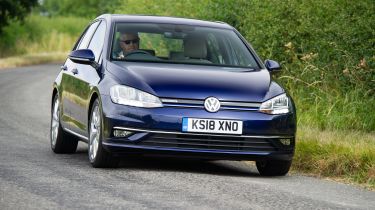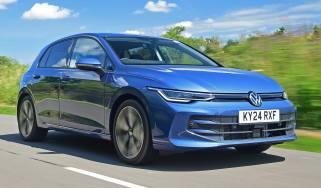Used Volkswagen Golf review: 2013 to 2019 (Mk7)
The compact family hatchback against which all others are judged, the Volkswagen Golf is refined, well built and a pleasure to drive
Pros
- High quality
- Fuel efficient
- Comfortable cabin
Cons
- Some reliability concerns
- Can be costly to buy
- Rivals better equipped
If you’re considering a used Volkswagen Golf Mk7 as your next car, chances are that you’ve been influenced – perhaps unwittingly – by this family hatchback’s longstanding reputation for quality, durability, dependability and all-round ease of ownership. Those strengths traditionally are what have kept prices of secondhand Golfs quite high, which can be annoying when you’re buying and a relief when you’re later selling.
A stylish yet un-flashy compact family hatchback, the Volkswagen Golf Mk7 is available in three- and five-door body styles, as well as a five-door estate car, a five-door mini-MPV called the SV, and a two-door cabriolet, although we won’t concern ourselves with the latter in this used car review. Depending on what type of driving you typically do, there should be an engine within Golf Mk7’s range of diesel and petrol turbocharged units to suit, whether you’re looking for excellent fuel economy at one end of the scale, or extreme performance at the other.
There’s also a fully electric version of the Golf Mk7 – the e-Golf – and a ‘plug-in hybrid’, the Golf GTE, which combines a petrol engine with an electric motor for better fuel economy and up to 30 miles of electric-only, emissions-free driving. If the majority of your motoring is within a city or town, these eco Golfs are a sensible choice; the e-Golf is exempt from annual road tax and congestion charges, as are some versions of the GTE.
What’s the history of the VW Golf Mk7?
This seventh generation Volkswagen Golf was introduced in January 2013 when the range comprised 1.2-litre and 1.4-litre petrol turbo engines (known as TSI), together with 1.6-litre and 2.0-litre diesel turbo engines (called TDI). A more economical and very low emissions diesel arrived later that year, the 1.6 TDI BlueMotion, as well as a sporty diesel, the GTD. Making its debut at the same time was the high performance turbocharged petrol Golf Mk7 GTI.
More reviews
Early in 2014 the Golf Mk7 range was expanded with an estate car variant, as well as the Golf R, a model that was even faster than the GTI and had four-wheel drive; the Sportsvan or SV mini-MPV was launched in 2014, too. A year later the plug-in hybrid Golf GTE made its debut, as did the all-electric e-Golf; 2015 also witnessed the introduction of the Golf Alltrack, an estate car with raised suspension and four-wheel drive, aimed at buyers looking for year-round mobility but who didn’t want a hulking off-roader. A year after that the economical Golf 1.0-litre TSI BlueMotion joined the line-up.
In 2017 the Golf Mk7 underwent a series of revisions and these cars are often refered to as the Mk7.5. The updates included minor changes to the car's styling, improvements to its equipment levels (notably an upgraded infotainment touchscreen with better smartphone connectivity) and the introduction of some new engines – the 1.2 TSI was replaced with a three-cylinder 1.0-litre turbocharged petrol engine, and the 1.4 TSI made way for the more fuel- and emissions-efficient 1.5 TSI. Meanwhile the Golf GTI and Golf R became more powerful, as did the Alltrack Golfs; in 2018 the Alltrack line-up gained a 1.8-litre turbocharged petrol engine. And in 2019 the Golf Mk7 was replaced by the Mk8.
Which is the best Golf Mk7 to choose?
The Golf Mk7 offers you a multitude of different engines and body styles, so which should you choose? Let’s deal with the obvious picks first. If you enjoy driving quickly then you’ll relish the Golf GTI, particularly one fitted with the optional Performance Pack – if you have deep pockets then the Golf R is even faster. However, the turbocharged diesel Golf GTD is also extremely rapid when called upon to be so, and can officially return up to 67.3mpg.
If you live in the countryside then the four-wheel drive Golf Alltrack estate car is an excellent alternative to a bulky SUV: look for one with the 178bhp 2.0-litre diesel engine if you also need to tow a trailer or caravan. With its large door apertures the taller-than-normal mini-MPV body style of the Golf SV makes it ideal for those with reduced mobility because of age or disability – it’s comparatively rare, though, so you may have to hunt around to find one.
But if you’re just after a Golf Mk7 and have no specific needs, then there a few rules of thumb. Choose a five-door model – it’s much easier for rear passengers to get in and out of. If your budget stretches, go for an automatic gearbox, often referred to as a DSG: it makes driving so much easier, although there’s nothing wrong with the Golf’s (five- and six-speed) manual gearboxes. Again budget will be a factor, but the post-2017 facelift cars look a bit smarter, have higher levels of equipment and more modern engines.
Although Golf Mk7s aren’t as lavishly equipped as some rivals, even the basic S trim grade has electric front windows, air-conditioning, electric door mirrors, colour touchscreen display and DAB digital radio. You probably don’t need any more than that, but if you do then the SE trim adds electric rear windows and 16-inch alloy wheels, as well as technology called Front Assist which automatically applies the brakes at low speeds when sensors detect an imminent collision with another car or a pedestrian.
However, we recommend that you look out for the Golf Match, introduced in July 2014, which has all the equipment of the SE and also features front and rear parking sensors and electrically folding door mirrors.
In terms of engine choice, the 1.0 TSI provides adequate performance in most situations, can deliver up to 49.6mpg, and is cheap to tax and insure. But if you regularly travel with five people aboard and their luggage, or you spend most of your time on the motorway, then the 1.5 TSI EVO is more relaxing to drive and, at up to 47.1mpg, is almost as economical: the pre-2017 1.4 TSI is a fine alternative.
What are the alternatives?
The Volkswagen Golf Mk7 has many rivals – the Ford Focus, Vauxhall Astra, Toyota Corolla, Honda Civic, Kia Ceed, Hyundai i30, SEAT Leon, Skoda Octavia, Peugeot 308, Mazda 3, Audi A3, BMW 1 Series and the MINI. Each of them is probably more talented than the Golf Mk7 in a particular area, and a few of them come close to matching the VW as an overall package. For the most satisfying blend of style, comfort, quality, performance, economy and driving pleasure, the Golf Mk7 is the best of the bunch.
Golf Mk7 video reviews
Volkswagen Golf Mk7.5
Volkswagen Golf Mk7
Volkswagen Golf Estate Mk7.5
Volkswagen Golf Estate Mk7
Volkswagen Golf GTI Mk7.5
Volkswagen Golf R Mk7












